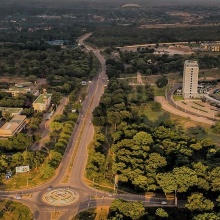Urban greenspaces underpin ecosystem service provision in cities and are therefore indispensable for human well-being. Nevertheless, they are increasingly disappearing from cities in Sub-Saharan Africa. Understanding how the stakeholders influencing urban greenspace management perceive the benefits provided by urban greenspaces and the challenges to its conservation and management is critical for reversing this trend. Malawian stakeholders with influence over urban greenspace management described the main focus of their organisation as relating to urban planning, natural resources protection and management, development work, or the hospitality business sector. Critically, only a third of all stakeholders focused on natural resources protection and management. Stakeholders had nuanced and varied appreciations of the benefits that greenspaces provide. Regulation and maintenance ecosystem services, as well as cultural services were frequently mentioned. However, provisioning services were mostly mentioned by those in development work. Stakeholders also identified an additional suite of societal benefits that do not directly map onto ecosystem service frameworks, such as the generation of financial income and the provision of employment opportunities. Challenges identified as hampering the planning, conservation and management of greenspaces included inappropriate urbanisation, lack of coordination and participation, and population growth. Lack of coordination was however not widely acknowledged among those focusing on natural resources protection, who conversely identified population growth more often than any other groups. Highlighting how stakeholders with varying priorities perceive ecosystem services a first step towards improving greenspaces management both for their better acceptation and for improving their potential for biodiversity conservation. Specifically, we bring attention to need for stakeholders working with natural resources protection to recognise more the need for collaborations and engagement. Additional research is also necessary to understand how those different perspectives might be integrated into ongoing processes and procedures to manage greenspaces in Sub-Saharan Africa.
Here's the link to the original publication:
Guenat, S., G. Porras Lopez, D. D. Mkwambisi and M. Dallimer (2021). Unpacking stakeholder perceptions of the benefits and challenges associated with urban greenspaces in Sub-Saharan Africa. Frontiers in Environmental Sciences 9: 591512.


